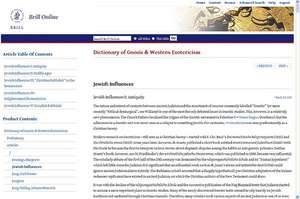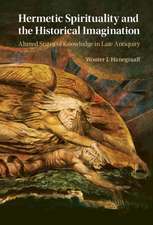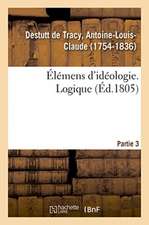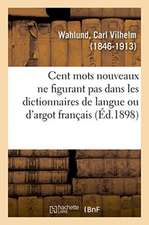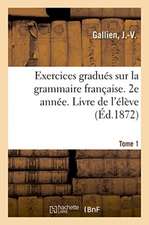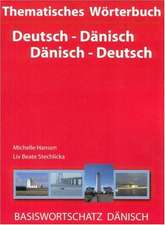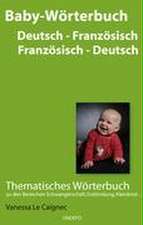Dictionary of Gnosis & Western Esotericism
Editat de Wouter J. Hanegraaffen Limba Engleză Hardback – 27 apr 2006
This is the first comprehensive reference work to cover the entire domain of “Gnosis and Western Esotericism” from the period of Late Antiquity to the present. Containing around 400 articles by over 180 international specialists, it provides critical overviews discussing the nature and historical development of all its important currents and manifestations, from Gnosticism and Hermetism to Astrology, Alchemy and Magic, from the Hermetic Tradition of the Renaissance to Rosicrucianism and Christian Theosophy, and from Freemasonry and Illuminism to 19th-century Occultism and the contemporary New Age movement. Furthermore it contains articles about the life and work of all the major personalities in the history of Gnosis and Western Esotericism, discussing their ideas, significance, and historical influence.
The Dictionary of Gnosis & Western Esotericism was selected Choice Outstanding Academic Title in 2006.
This one volume edition is an unabridged version of the two volume edition published in 2005, for details click here
Preț: 1326.01 lei
Preț vechi: 1617.08 lei
-18% Nou
Puncte Express: 1989
Preț estimativ în valută:
253.76€ • 263.43$ • 211.60£
253.76€ • 263.43$ • 211.60£
Carte disponibilă
Livrare economică 01-15 martie
Preluare comenzi: 021 569.72.76
Specificații
ISBN-13: 9789004152311
ISBN-10: 9004152318
Pagini: 1228
Dimensiuni: 160 x 240 x 61 mm
Greutate: 1.83 kg
Editura: Brill
Colecția Brill
ISBN-10: 9004152318
Pagini: 1228
Dimensiuni: 160 x 240 x 61 mm
Greutate: 1.83 kg
Editura: Brill
Colecția Brill
Public țintă
All those interested in the history of religion, intellectual history, art and culture in Western society from Antiquity to the present, as well as classicists, medievalists, historians, and theologians.Cuprins
A selection of entries:
Alchemy; Amulets; Aristotelianism; Astrology; Bacon, Francis; Blake, William; Blavatsky, Helena Petrovna; Boehme, Jacob; Bogomilism; Catharism; Christian Theosophy; Comenius, Jan Amos; Clement of Alexandria; Cusa, Nicholas of; Dante Alighieri; Cryptography; Dionysius Areopagita, -Pseudo; Eriugena, Johannes Scottus; Ficino, Marsilio; Freemasonry; Gnosticism; Grail traditions; Hermes Trismegistus; Hermetic Literature; Illuminism; Intermediary Beings; Jewish Influences
Jung, Carl Gustav; Kabbalah; Magic; Manichaeism; Music; Mysticism; Neopaganism; Neoplatonism; New Age Movement; Newton, Isaac; Occult / Occultism; Paracelsus; Pico della Mirandola, Giovanni; Reincarnation; Rosicrucianism; Satanism; Scientology; Secrecy; Spiritualism; Steiner, Rudolf; Swedenborg, Emanuel; Tarot; Templars; Valentinus and Valentinians; Witchcraft (15th – 17th Centuries); Zoroaster
Alchemy; Amulets; Aristotelianism; Astrology; Bacon, Francis; Blake, William; Blavatsky, Helena Petrovna; Boehme, Jacob; Bogomilism; Catharism; Christian Theosophy; Comenius, Jan Amos; Clement of Alexandria; Cusa, Nicholas of; Dante Alighieri; Cryptography; Dionysius Areopagita, -Pseudo; Eriugena, Johannes Scottus; Ficino, Marsilio; Freemasonry; Gnosticism; Grail traditions; Hermes Trismegistus; Hermetic Literature; Illuminism; Intermediary Beings; Jewish Influences
Jung, Carl Gustav; Kabbalah; Magic; Manichaeism; Music; Mysticism; Neopaganism; Neoplatonism; New Age Movement; Newton, Isaac; Occult / Occultism; Paracelsus; Pico della Mirandola, Giovanni; Reincarnation; Rosicrucianism; Satanism; Scientology; Secrecy; Spiritualism; Steiner, Rudolf; Swedenborg, Emanuel; Tarot; Templars; Valentinus and Valentinians; Witchcraft (15th – 17th Centuries); Zoroaster
Notă biografică
Wouter J. Hanegraaff is Professor of History of Hermetic Philosophy and Related Currents at the University of Amsterdam, The Netherlands. He has published extensively on modern and contemporary Western esotericism, including a book devoted to the 15th-century Christian Hermetist Lodovico Lazzarelli and a monograph on the New Age movement.
Antoine Faivre is Professor Emeritus of History of Esoteric and Mystical Currents in Modern and Contemporary Europe at the 5th section of the École Pratique des Hautes Études (Sorbonne), Paris, France.
Roelof van den Broek is Professor Emeritus of History of Christianity at the University of Utrecht, The Netherlands.
Jean-Pierre Brach is Professor of History of Esoteric Currents in Modern and Contemporary Europe at the 5th section of the École Pratique des Hautes Études (Sorbonne), Paris, France.
Antoine Faivre is Professor Emeritus of History of Esoteric and Mystical Currents in Modern and Contemporary Europe at the 5th section of the École Pratique des Hautes Études (Sorbonne), Paris, France.
Roelof van den Broek is Professor Emeritus of History of Christianity at the University of Utrecht, The Netherlands.
Jean-Pierre Brach is Professor of History of Esoteric Currents in Modern and Contemporary Europe at the 5th section of the École Pratique des Hautes Études (Sorbonne), Paris, France.
Recenzii
'This superb dictionary should be an early stop for readers seeking basic, up-to-date, scholarly introductions to many aspects of Western religious eclecticism. There is no reference like it for its range and the objectivity of its coverage. Summing Up: Essential. All academic libraries serving upper-level undergraduates and above.'
S. Young, Choice, 2006
'The entries present balanced, neutral accounts of the topics and the major persons involved with them without simplification, distortion, or reductionism...scholars will be delighted to have such a treasure take its place next to the popular treatments of the field. Summing Up: Highly recommended. All collections.'
M.R. Pukkila, Choice, 2005.
'The Dictionary of Gnosis and Western Esotericism is a brilliantly conceived and skillfully executed reference tool unlike anything the scholarly world has ever seen. In two massive volumes it covers every aspect of pagan, Jewish, and Christian religious discourses and phenomena traditionally labeled gnosticism, hermeticism, astrology, magic, the "occult sciences," esoteric religion, and much more. The detailed and insightful articles, on nearly every related topic imaginable, are produced by an impressive array of renowned scholars, and usefully include up-to date bibliographies. Six years in the making, this is a work that every student of religion, ancient and modern, will certainly want to own.'
Bart D. Ehrman, James A. Gray Distinguished Professor and Chair of Religious Studies, University of North Carolina at Chapel Hill
'The Dictionary of Gnosis & Western Esotericism is a must for any who would consider themselves a scholar of Esotericism, and should at the very least be in every academic library in the English-speaking world.'
J. Gordon Melton, Center for Studies on New Religions, 2005
'… this important new reference work should be consulted by all those engaged in research in the areas covered by the dictionary. The reach of this work is truly astounding. The Dictionary of Gnosis and Western Esotericism promises to be the pre-eminent reference work of its kind for many years to come.'
Andreas J. Köstenberger, Faith & Mission, 2005
'The Dictionary places gnosis and esotericism in its historical perspective – not only the breadth of the described phenomenon is surprising, but also the fact that the subjects are covered in such an objective fashion.'
NRC Handelsblad, 2005
'Brill has produced a work on esotericism that will become the standard reference work on the subject. Never before has such a complete overview of this obscure peripheral area of religion appeared.'
Leidsch Dagblad (Associated Press Services), 2005.
S. Young, Choice, 2006
'The entries present balanced, neutral accounts of the topics and the major persons involved with them without simplification, distortion, or reductionism...scholars will be delighted to have such a treasure take its place next to the popular treatments of the field. Summing Up: Highly recommended. All collections.'
M.R. Pukkila, Choice, 2005.
'The Dictionary of Gnosis and Western Esotericism is a brilliantly conceived and skillfully executed reference tool unlike anything the scholarly world has ever seen. In two massive volumes it covers every aspect of pagan, Jewish, and Christian religious discourses and phenomena traditionally labeled gnosticism, hermeticism, astrology, magic, the "occult sciences," esoteric religion, and much more. The detailed and insightful articles, on nearly every related topic imaginable, are produced by an impressive array of renowned scholars, and usefully include up-to date bibliographies. Six years in the making, this is a work that every student of religion, ancient and modern, will certainly want to own.'
Bart D. Ehrman, James A. Gray Distinguished Professor and Chair of Religious Studies, University of North Carolina at Chapel Hill
'The Dictionary of Gnosis & Western Esotericism is a must for any who would consider themselves a scholar of Esotericism, and should at the very least be in every academic library in the English-speaking world.'
J. Gordon Melton, Center for Studies on New Religions, 2005
'… this important new reference work should be consulted by all those engaged in research in the areas covered by the dictionary. The reach of this work is truly astounding. The Dictionary of Gnosis and Western Esotericism promises to be the pre-eminent reference work of its kind for many years to come.'
Andreas J. Köstenberger, Faith & Mission, 2005
'The Dictionary places gnosis and esotericism in its historical perspective – not only the breadth of the described phenomenon is surprising, but also the fact that the subjects are covered in such an objective fashion.'
NRC Handelsblad, 2005
'Brill has produced a work on esotericism that will become the standard reference work on the subject. Never before has such a complete overview of this obscure peripheral area of religion appeared.'
Leidsch Dagblad (Associated Press Services), 2005.
